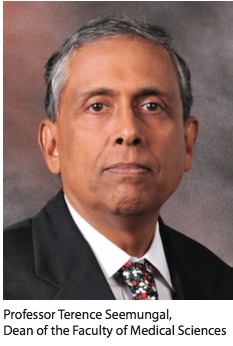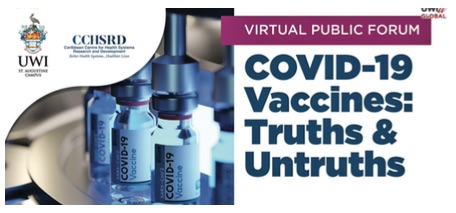
Vaccine hesitancy is a growing issue in Trinidad and Tobago, and the Caribbean, and many do not believe they should take the new AstraZeneca vaccine, despite the evidence that has shown its effectiveness. They have been listening to the news reports on the potential for a rare clotting disorder, or to online influencers who have been insisting that the vaccine is a sinister way to implant microchip trackers.
On Tuesday, April 27, 2021, UWI St Augustine’s Caribbean Centre for Health Systems Research and Development (CCHSRD), Faculty of Medical Sciences (FMS) and Faculty of Social Sciences (FSS) hosted the virtual public forum “COVID-19 Vaccines: Truths and Untruths” to deal with concerns and misinformation.
Experts at the forum included Professor Clive Landis, Chair of the UWI COVID-19 Task Force; Dr Jeffrey Edwards, Lecturer in Public Health; Dr Talia Esnard, Sociologist and Department of Behavioural Sciences’ Head; Professor Christine Carrington, Professor of Molecular Genetics and Virology; and Professor Terence Seemungal, Pulmonologist and Dean of FMS. They answered questions that ranged from blood-clotting concerns, immunity, vaccine ingredients, and even the idea that the vaccines contained tracking technology. When asked the burning question, “can you develop clots from taking the vaccine”, Professor Seemungal said, “Yes, there is a possibility of a rare disorder, but it is just that: very rare. You have to balance the risk of that disorder against the risk of death from COVID-19”.
The current estimated chance of developing a clot via the AstraZeneca vaccine is around five in every one million (in the UK). However, if you happen to develop one of these rare clots, the local medical community has the information to treat it, based on guidelines developed in the UK and EU.
Another question was, why even take the vaccine if you are a healthy individual? Isn’t having a natural healthy immune system sufficient? It was pointed out that the vaccine allows the development of an immune response without being exposed to the actual virus.
“This immunity builds a person’s resistance to fight the virus. Developing immunity through vaccination means that there is a reduced risk of developing severe illness and death due to COVID,” said Dr Edwards.
Natural immunity from infection vs COVID-19 vaccine? In simple terms, if you have recovered from COVID-19, taking the vaccine is still necessary to reduce the risk of contracting the disease again.
The science has already shown how the vaccine has begun to change the landscape of the pandemic. Prior to the vaccination rollout in December 2020, the UK was experiencing on average near 420 deaths daily, which peaked in January at 1285. Now, with a 67 percent vaccinated population, their daily death toll is an average of nine.
But, what about the microchips? Purely harmful misinformation. When it comes to the spread of information online and how we should consume it, Dr Esnard urged the public to always be critical of what we hear and ask questions of the information we receive.

“A conversation about the information that is spreading through social media, through social influencers and what is coming out of credible sources needs to be had,” she said. “If we do not have an authentic conversation, there will be a deeper mistrust for healthcare workers, which would move the population from vaccine hesitancy to vaccine refusal.”
So, while the Caribbean has, “done an excellent job in maintaining good public health; CARICOM in particular” according to Professor Landis, we still must continue to do our part, and when able, get vaccinated!
Check out UWI St Augustine Facebook page to catch the replay of the virtual forum.